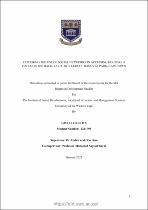Exploring the use of social networks in accessing housing: A focus on the back-yard dwellers of Hanover Park, Cape Town
Abstract
This study explored social capital and social networks within the affordable housing arena. Although Apartheid officially ended in 1994 with the first non-racial democratic elections, the current housing spatial planning is still along racially discriminatory lines with little change to the current housing typography experienced in South Africa. The housing market and development lends to discriminatory behaviour, by categorizing certain racial groups and steering these marginalised groups back to housing choices in social and economically deficient areas. This engineered selection process perpetuates racial and economic inequality. This study aims to explore why these groups of people, without any social capital or networks, struggle to access resources. This study also aims to show the correlation between ill-equipped housing and health outcomes.

